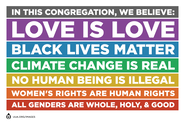How is it going with you? With your mind, body and soul?
I have no doubt you’re adopting the “new normal” habits of daily life -- frequent handwashing, extra-careful trips to the grocery store, necessary changes in routines and living situations, and staying connected to others in new ways. It’s stressful!
Having to practice physically distancing with our usual social circles reminds us how important those social contacts are for maintaining our own mental health and resilience. We need people in our lives to help us re-center when we’re caught off guard by the latest breaking news or help us re-frame the disappointment we feel when a long-awaited event in the not too distant future is cancelled. They’re part of the “safety net” that help sustains us when we wonder, when will things “get back to normal?”
The Unitarian Universalist Mental Health Network is sharing these Mental Health Resources during the Pandemic which you might find helpful in the weeks, if not months, ahead. This Network is a relatively new UU non-profit, which supports and advocates on behalf of people affected by mental health issues in our congregations and in the larger world. They provide a repository of mental health information and resources for UUs and UU congregations.
Mental Health Wellness Tips During Quarantine, written by New York City-based psychologist and mother of young children, Dr. Eileen Feliciano, has some valuable suggestions and insights. Today, I commend to you Tips #24 and #25:
“#24: Remind yourself daily that this is temporary. It seems in the midst of this quarantine that it will never end. It is terrifying to think of the road stretching ahead of us. Take time to remind yourself that although this is very scary and difficult, and will go on for an undetermined amount of time, it is a season of life and it will pass. We will return to feeling free, safe, busy, and connected in the days ahead.
#25: Find the lesson. This whole crisis can seem sad, senseless, and at times, avoidable. When psychologists work with trauma, a key feature to helping someone work through said trauma is to help them find their agency, the potential positive outcomes they can effect, the meaning and construction that can come out of destruction.”
This author poses questions many of us are pondering, and I encourage you to take time to reflect upon them:
And then, “reach out and touch someone” – pick up the phone or log onto your computer and connect to someone in your social circles with whom you can share your thoughts in a heart-to-heart conversation.
Your mind, body and soul will thank you!
With blessings for the journey,
Rev. Cindy
I have no doubt you’re adopting the “new normal” habits of daily life -- frequent handwashing, extra-careful trips to the grocery store, necessary changes in routines and living situations, and staying connected to others in new ways. It’s stressful!
Having to practice physically distancing with our usual social circles reminds us how important those social contacts are for maintaining our own mental health and resilience. We need people in our lives to help us re-center when we’re caught off guard by the latest breaking news or help us re-frame the disappointment we feel when a long-awaited event in the not too distant future is cancelled. They’re part of the “safety net” that help sustains us when we wonder, when will things “get back to normal?”
The Unitarian Universalist Mental Health Network is sharing these Mental Health Resources during the Pandemic which you might find helpful in the weeks, if not months, ahead. This Network is a relatively new UU non-profit, which supports and advocates on behalf of people affected by mental health issues in our congregations and in the larger world. They provide a repository of mental health information and resources for UUs and UU congregations.
Mental Health Wellness Tips During Quarantine, written by New York City-based psychologist and mother of young children, Dr. Eileen Feliciano, has some valuable suggestions and insights. Today, I commend to you Tips #24 and #25:
“#24: Remind yourself daily that this is temporary. It seems in the midst of this quarantine that it will never end. It is terrifying to think of the road stretching ahead of us. Take time to remind yourself that although this is very scary and difficult, and will go on for an undetermined amount of time, it is a season of life and it will pass. We will return to feeling free, safe, busy, and connected in the days ahead.
#25: Find the lesson. This whole crisis can seem sad, senseless, and at times, avoidable. When psychologists work with trauma, a key feature to helping someone work through said trauma is to help them find their agency, the potential positive outcomes they can effect, the meaning and construction that can come out of destruction.”
This author poses questions many of us are pondering, and I encourage you to take time to reflect upon them:
- “What can each of us learn here, in big and small ways, from this crisis?
- What needs to change in ourselves, our homes, our communities, our nation, and our world?”
And then, “reach out and touch someone” – pick up the phone or log onto your computer and connect to someone in your social circles with whom you can share your thoughts in a heart-to-heart conversation.
Your mind, body and soul will thank you!
With blessings for the journey,
Rev. Cindy

 RSS Feed
RSS Feed


